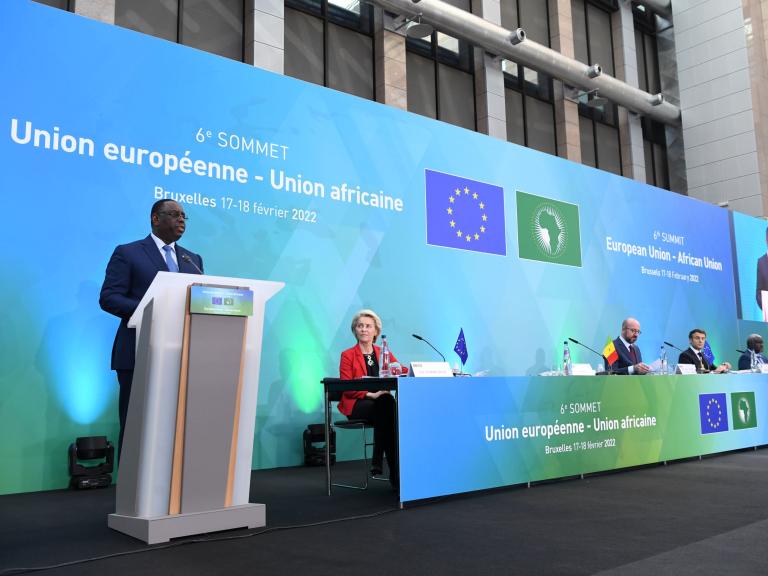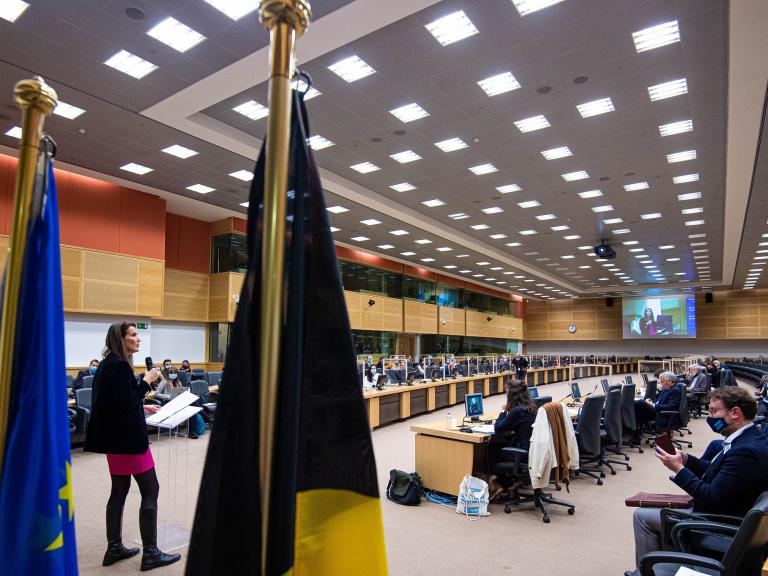-
Last updated on

Erasmus+ makes our universities much more international. © UGent
In this series, we are giving people the opportunity to demonstrate the positive impact of the EU, for each of the current European Commission's 6 priorities(. Today comes the 6th and final part: Promoting our European Way of Life.

Geneviève Cochez © UGent
Many people have probably heard, even only vaguely, of Erasmus or Erasmus students. It's about students studying at a European university for a while, isn't it? That's true, though it has since become much more than that.
Fostering European citizenship
Erasmus was launched 35 years ago, in 1987. 'The European Community at the time wanted to gain popularity with the people,' says Cochez, coordinator of the Erasmus+ programme at Ghent University. 'And at that time, higher education students were a grateful target group, since their minds are already naturally more open to new opportunities. If students studied in another European country, it would foster a sense of European citizenship. They would get to know other European cultures, their language skills would improve... At the same time, it would make it easier for Europe to coordinate higher education in the various countries and improve its quality.’
Initially, things were somehow difficult. Cochez explains: 'It wasn't simple to recognise a year of study at a foreign university just like that. For example, not all universities awarded credits in the same way. The degree programmes were also organised differently at the start. We had to deal with 'candidatures' and 'licentiates', other countries had a different system. Encouraged by Erasmus, 29 education ministers of European countries signed the Bologna Declaration in 1999, creating the 'European Higher Education Area'. As a result, we now have Bachelor and Master’s degrees in 49 countries and we readily recognise one other's degrees.'
More than just students
The teething problems are now long gone and Erasmus has since become Erasmus+. Cochez: 'Erasmus+ is much broader. So, it also includes adult education, technical training, compulsory education, and so on. It means not only students, but also university staff can spend some time working at a university abroad. Professors can give guest lectures, and people in technical roles can learn, for example, how a foreign university organises its student housing. It should also be mentioned that Erasmus+ allows students to not only study elsewhere, but also to take internships, even after their studies. This could be attractive for a medical or psychology student.'
Partnership
Erasmus+ also allows for the development of some significant projects. 'For example, under Erasmus Mundus, the four semesters of a two-year Master's degree can each be taken in a different country,' Cochez says. 'Ghent University was also able to obtain funding under the prestigious European Universities Initiative. In the ENLIGHT project, we are now working closely with a network of nine universities to do things such as adapt our curricula to the 21st century.'
What is special about Erasmus+ is that it extends beyond just the EU. Cochez continues: 'Erasmus has traditionally applied to the EU countries and some adjacent countries such as Turkey, Serbia, and Norway. Under Erasmus+, other industrialised and developing countries can also participate. Working with those countries involves a great deal of capacity building, asking questions, such as, how do I set up projects? How do I improve the quality of education programmes? How do I build an administration and an international service? Those kinds of things – and Ghent University is actively involved in this.'

Welcome days: Newly arrived foreign students are shown how to find their way within UGent. © UGent
European economy
No university needs to be convinced of the usefulness of the Erasmus+ programme. The original goal of streamlining European higher education has undoubtedly succeeded: not only do we find Bachelor and Master's programmes everywhere, but the learning outcomes of, say, a Bachelor's degree in history, are similar. This is important in a unified Europe where borders are blurring. There is also much more teaching in English, the definitive language of science.
Sound higher education is also essential to keep Europe's economy on a firm footing; after all, the world arena with superpowers such as China and the US is quite competitive. And then it helps if the EU can prepare students with skills that fulfil the needs of society. They need to be familiar with the notions of diversity, inclusion, sustainability, language skills, lifelong learning, democratic values, and so on. Moreover, the EU needs profiles that are ready to face major challenges such as the green and digital transition.
The fact is: a university can no longer exist without international contacts. 'Every day, we learn from each other, while others learn from us,' adds Cochez.
A more solid foundation
The students themselves also benefit greatly from spending time in another country. 'They learn all kinds of things that they can't learn in Ghent,' Cochez explains. 'Their English improves and they often also pick up something from the language and culture of the country. Plus, they learn how to look after themselves, of course. The first few weeks can be quite challenging, with feelings of loneliness and loss. But it gives them a more solid foundation afterwards. They are also sometimes introduced to a different way of teaching. For example, some universities start students off in small groups from Day 1 in which they are constantly discussing with each other or they are constantly being evaluated.'
It is important to mention too that 70–75% of Erasmus students find a job afterwards thanks to the Erasmus+ exchange. After all, employers appreciate not only knowledge, but also skills such as flexibility and being able to adapt easily to a new environment.
Envy
For Geneviève Cochez, it is abundantly clear: Erasmus+ means a great deal to Ghent University. The numbers speak for themselves: In a normal, non-pandemic year, about 1,250 Ghent students go abroad for their studies, about 250 of them for internships. About the same number of foreign students come to Ghent through Erasmus+. The 750 or so non-Erasmus+ exchanges at Ghent University are also based on the Erasmus model.
'Ghent University receives about 2 million euros annually from Erasmus+, and that pays for a lot of exchanges,' Cochez concludes. 'Not forgetting the much higher amounts of money we attract for research through Horizon Europe. Without European money, research would be impossible and exchanges very difficult. Other parts of the world are quite envious of that.'
Unfortunately, exchanges under the Erasmus programme virtually came to a standstill uring the pandemic. But the programme is steadily getting back on track. Let's hope there are no new spanners in the works.
Promoting our European Way of Life
The European Commission wants to protect its citizens and its values. For this reason, the rule of law is central to a European Union characterised by equality, tolerance and social fairness. In addition to paying close attention to education and training, this priority also includes consumer protection, fundamental rights, a European health union, a European security union, and so on. The EU also wants a fresh approach to migration.
Curious about all the benefits of the EU?
More on Cooperation

EU-AU summit: two unions, one vision
In Brussels, the European and African Union developed a hopeful plan for the future that should bring prosperity and stability t...

EU: more democracy in practice
Geography teacher Rafik Kiouah talks about his participation in a Belgian citizens' panel on a more democratic EU as part of the...

The EU joins forces for external action
The European Union is combining various funding channels into a single instrument: Global Europe. The simplification will give t...
